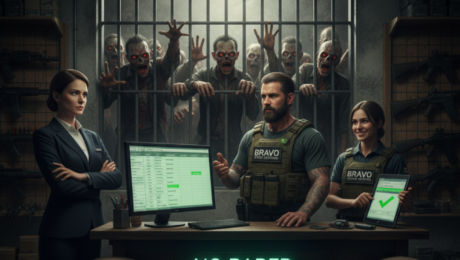In the firearms industry, the paper Form 4473 isn’t just an outdated document—it’s a productivity bottleneck. From endless handwriting to manual reviews, this paper-heavy process creates headaches for your team and risk for your business. Still using paper? Every single day you’re incurring unnecessary costs, facing compliance risks, and wasting valuable time. The real question isn’t whether you should switch to an electronic Form 4473—but why haven’t you yet. Here’s a breakdown of the hidden costs of paper and how switching to a digital solution like Bravo E4473 can pay for itself. The Hidden Costs of Paper Human Error: The #1 Source of ATF Violations Illegible handwriting, skipped fields, and correction errors lead to rework and citations. This puts your FFL at risk and could cost you fines or worse. Wasted Time: Payroll on Paper Your team spends too much time reviewing, correcting, and filing paper forms instead of selling and serving customers. Compliance tasks should never eat into your profits. Audit Headaches: Slow Retrieval & Increased Risk Paper records are a pain to retrieve. ATF audits mean sifting through piles of paper—time-consuming and stressful. Storage Costs: Valuable Space Wasted Storing 20 years of paper records is required by law, but that space could be used to display products or improve customer experience. The E-Form Advantage: Why Digital Pays You Back Switching to an electronic Form 4473 system eliminates these pitfalls, transforming compliance from a burden into a seamless part of your daily workflow. Eliminate Human Error (Protect Your FFL) Digital systems have built-in compliance checks to ensure every field is completed accurately and legibly. No more unreadable handwriting. Mandatory fields ensure nothing is missed. Guided corrections reduce rework and prevent costly mistakes. Reclaim Staff Time (Boost Productivity) With instant validation and a streamlined process, your team will spend less time on paperwork and more time on customers. Instant review cuts correction time by up to 90%. Faster transactions mean faster sales. No filing or sorting required—ever. Stress-Free Audits (Instant Retrieval) When the ATF shows up, you’ll be ready. All records are indexed and stored securely in the cloud. Retrieve any form in seconds, reducing audit time and stress. Save Storage Costs (Maximize Retail Space) Say goodbye to filing cabinets and wasted space. Secure digital storage removes the physical burden of 20 years of recordkeeping. Reclaim square footage for higher-value use, like product displays or service counters. It’s an Investment, Not an Expense Switching to electronic Form 4473 is a smart business decision that protects your FFL, increases efficiency, and saves valuable time and space. The reduction in errors and reclaimed productivity alone ensures your digital solution quickly pays for itself—while keeping you audit-ready every single day. Bravo and E4473.com: Partners in a Seamless Transition Switching to digital doesn’t have to be complicated. Bravo Store Systems, together with E4473.com, brings you the experience, tools, and support to modernize your compliance workflows with confidence. From setup to training, we’re here to ensure your transition is seamless, and your records stay audit-ready 24/7. Upgrade Your Compliance with Bravo’s Digital 4473 Solution Switching to digital doesn’t have to be complicated. Bravo Store Systems brings you the experience, tools, and support needed to modernize your compliance workflows with confidence. From setup to training, we’re here to ensure your transition is seamless, and your records stay audit-ready 24/7. Our Customers Agree Rating: ⭐⭐⭐⭐⭐ (5/5) Source: Facebook/Social Media Post Business: Pawn Montana Inc. Customer: Clint Wheeler Testimonial: “Bravo’s E4473 is so seamless. All our customers say it’s the best/easiest one in town to buy from. Cuts out human error and my ATF auditor said it was the best he has ever delt with. Just made the change to cloud storage 4473’s. No more boxes or holding forever. Can’t say enough about how bravo streamlines my business.” Ready to see how electronic 4473 transforms compliance into confidence. Get a firsthand look at how fast, accurate, and audit-ready your operation can be. 👉 Book the Walkthrough
For Federal Firearms Licensees (FFLs), compliance isn’t optional — it’s the backbone of your business. But every paper ATF Form 4473 you file carries hidden costs: hours of labor, storage fees, and the ever-present risk of clerical error. E4473 by Bravo Store Systems replaces that friction with automation, accuracy, and audit-ready confidence — built right into your point of sale. The Hidden Costs of Paper 📜 Paper may look cheap, but it drains profit in four ways: Pitfall: Human Error – Hidden Cost: The #1 source of ATF violations. Handwriting, skipped fields, and correction errors create rework, citations, and risk. Pitfall: Time Sink – Hidden Cost: Staff spend paid hours reviewing, correcting, and filing forms instead of helping customers. Pitfall: Audit Stress – Hidden Cost: ATF audits mean digging through cabinets and boxes—slow retrieval increases inspection time and exposure. Pitfall: Storage Overhead – Hidden Cost: You pay for valuable space to store 20 years of records that could live securely in the cloud. The ROI of Going Digital 💰 Transitioning to a digital 4473 isn’t a tech upgrade — it’s a profitability move that saves time, eliminates errors, and protects your license. Fewer Errors, Greater Protection E4473 validates every field before submission, preventing the mistakes that drive most ATF violations. Real-time validation: Customers can’t skip required questions or enter invalid data. Built-in help text: Clarifies confusing items, reducing clerk intervention. Perfect legibility: Every form is clean, consistent, and auditor-ready — no handwriting to interpret. Result: fewer corrections, faster audits, and less stress for your compliance team. Time Saved Is Revenue Earned Every minute not spent on paperwork is a minute spent selling, serving, or training. Accelerated completion: Customers fill out the digital 4473 on a kiosk or tablet — no duplicate data entry. Instant retrieval: Locate any form in seconds instead of hours. Integrated workflows: E4473 connects with NICS and your A&D Bound Book for automatic updates. That’s how Bravo turns compliance time into business time. Lower Overhead, Higher Security Cloud retention: Records are securely stored for the full 20-year retention period — accessible anywhere, anytime. No paper storage: Free up square footage for merchandise, not filing cabinets. Disaster-ready backups: Protection against fire, flood, or theft — risks that destroy paper but not encrypted cloud data. Make the Switch with Bravo Store Systems Migrating from paper to digital compliance can sound daunting, but Bravo Store Systems makes it simple. E4473 is fully integrated with Bravo Point of Sale, giving you one system for sales, loans, and firearms compliance — no plug-ins, no double work. Unified workflow: Sell an item, auto-generate the digital 4473, update your bound book — all in one motion. Audit-ready 24/7: Digital retention to ATF spec; export in clicks, not hours. Expert support: Bravo’s firearms specialists understand ATF protocols and help your team stay inspection-ready year-round. Stop paying for inefficiency. Start operating with precision, speed, and compliance built in. 👉 See How E4473 Works ›
Expert Guidance from E4473 (a product of Bravo Store Systems) As of October 1, 2025, the federal government has officially entered a shutdown following Congress’s failure to pass a budget. For Federal Firearms Licensees (FFLs), this moment demands clarity, precision, and proactive compliance. Understanding which federal functions remain active—and which do not—is critical to maintaining lawful operations. At E4473 (Part of Bravo Store Systems), our mission is to provide the most trusted digital infrastructure for ATF compliance—purpose-built to help FFLs maintain accuracy, continuity, and audit-readiness even during federal uncertainty. Federal Functions Affected by the Shutdown Several essential ATF functions are temporarily paused until federal funding is restored: ATF NFA Branch Closed: The National Firearms Act (NFA) Branch has suspended all reviews and approvals. While Form 1, Form 3, and Form 4 submissions can still be filed, no processing will occur until staff return. Distributor Transfers (Form 3s) Paused: Distributors cannot ship regulated items (e.g., silencers) unless their Form 3 was pre-approved, restricting inventory flow. Customer NFA Transfers Delayed: Examiner review of customer Form 4s is paused, delaying final delivery of NFA items. FFL Licensing Center Frozen: New FFL and SOT applications and renewals are on hold until normal operations resume. Functions That Remain Operational Not all systems stop during a shutdown. Key services essential to daily firearm sales continue: FBI NICS Checks Remain Active: The National Instant Criminal Background Check System remains operational, allowing firearm transfers using Form 4473 without interruption. Form 4473 Processing Unaffected: Daily sales and transfers may continue as usual, provided all Form 4473 entries are accurate and complete. Pro Tip: Use the downtime to prepare NFA transactions—capture customer data, collect fingerprints, and pre-fill digital forms so submissions are ready when ATF systems reopen. Strengthening Compliance Amid Uncertainty Periods of political uncertainty often bring increased firearm activity. With higher transaction volume and reduced federal oversight, compliance precision matters more than ever. Paper-based 4473 errors—such as missing initials or incorrect dates—remain violations that can trigger citations or even license risk. That’s where Bravo E4473 delivers proven protection: Digital Precision → No Paper Errors Built-in field validation and automated compliance checks eliminate manual mistakes before they happen. Audit-Ready 24/7 Every record is securely stored, organized, and instantly exportable—so inspection readiness is never in question. Scalable for High-Volume Operations Handle transaction surges seamlessly without sacrificing accuracy or compliance integrity. Customer Proof: ATF Audit Success in the Field Mark H., Owner — Casa Pawn “Our IOI’s parting comments were, ‘This is the cleanest audit I have had in a pawn shop, ever.’ While our team’s effort contributed to that result, Bravo gets most of the credit. There is no mistaking that E4473, combined with Bravo’s recordkeeping, makes audits this smooth.” This experience reflects what thousands of FFLs report with Bravo E4473—error-free audits, faster inspections, and total confidence under pressure. Conclusion: Compliance Without Compromise A federal shutdown may pause key ATF functions—but your operation doesn’t have to pause with it. E4473 (Part of Bravo Store Systems) ensures your business stays compliant, efficient, and ATF-ready 24/7, no matter the political climate. Stay prepared. Stay compliant. Stay ahead. → Learn more at www.e4473.com
The air is thick with dread. Not just the scent of decomposing undead, but that familiar, icy chill of an impending ATF audit. “But… but it’s the apocalypse!” you stammer, sweat beading on your brow. “There are zombies at the gate! Surely, they’ll understand!” Think again, brave FFLs and savvy pawn shop owners. While the world outside your fortified establishment may have devolved into a shambling, brain-munching free-for-all, some things remain sacred. And at the top of that list, right next to a fresh clip of 5.56, is ATF compliance. That’s right. Even when the moon is full, the dead walk the earth, and your best customer is a survivor trading canned goods for a new AR, the good ol’ ATF still expects your ducks (and your 4473s) to be in a row. Because let’s face it, a ghoul-infested wasteland is no excuse for a messed-up bound book. The Horror of Non-Compliance: More Terrifying Than a Horde of Walkers Imagine this nightmare scenario: You’ve survived the initial onslaught. Your shop is a beacon of hope (and firepower) in a desolate landscape. Then, a lone figure, impeccably dressed despite the global collapse, strolls in. It’s an ATF agent, and they’re not here for a new tactical flashlight. They’re here for your records. Missing 4473s? That’s not just a fine, that’s a major infraction – and in the apocalypse, resources are too precious to waste on administrative penalties. Bound Book Errors? A tangled mess of paper in a world already full of actual tangles (of entrails, mostly) is an invitation for trouble. Improper Dispositions? Explaining that you “bartered a shotgun for three cans of peaches and a slightly-chewed baseball bat” won’t fly without the right digital trail. The moral of the story? A sloppy FFL isn’t just a risk; it’s a target. And while zombies might eat your brains, the ATF can eat your license – a far more devastating blow to your post-apocalyptic enterprise. Your Zombie Apocalypse Survival Kit: E44733.com & Bravo Store Systems Thankfully, you don’t have to face this double threat alone. While you’re busy defending your perimeter from the groaning masses, E4473 3.com and Bravo Store Systems are working tirelessly behind the scenes to keep your business bulletproof from the other kind of audit. 1. E4473.com: Digital Fortification for Your Form 4473s In a world where paper is a fire hazard and a zombie could sneeze all over your paperwork, E4473 .com is your digital fortress. This isn’t just an electronic version of a form; it’s an intelligent shield. E4473.com catches common errors on the spot, like a guardian angel whispering “You forgot to check box 10b” before the ATF can even raise an eyebrow. It ensures every form is properly filled out, so you’re not left scrambling to correct mistakes with a quill pen and a broken gas lamp. Plus, every completed form is securely stored in the cloud, safe from floods, fire, and the inevitable zombie-induced power outage that would destroy your old hard drive. When an ATF agent does show up, you can simply pull up a clean, digital record with a few clicks, proving your diligence even in the face of total chaos. 2. Bravo Store Systems: Your Bound Book in the Cloud Forget your dusty, water-damaged A&D bound book. In the apocalypse, every inch of space is precious and every second counts. With Bravo Store Systems, your inventory and bound book are integrated into a single, seamless digital platform. This is your mission-critical command center. When you trade a revolver for a fresh carton of eggs, Bravo instantly and correctly logs the transaction. When you receive a shipment of much-needed ammo (if the delivery truck made it), it’s entered into your system with the click of a button. It keeps a perfect, real-time record of every firearm entering and leaving your inventory. This means no more transcription errors, no more misplaced pages, and no more fumbling through old books while a zombie is pounding on the front door. Bravo gives you the peace of mind to focus on what really matters: keeping your survivors armed and your business thriving. The Last Stand for Your FFL This Halloween, remember: the real horror isn’t the zombies outside — it’s a missed 4473 or bound book error inside. With E4473, every form is validated at entry and stored to spec, so you’re always ready when an inspector appears. With Bravo Store Systems, every firearm is logged in real time — acquisitions and dispositions posted instantly, bound book audit-ready 24/7. Because in the apocalypse (or just a busy season), the only thing scarier than the undead is an ATF inspection you’re not prepared for. 👉 Book a Walkthrough
A Safer Way to Sell Firearms
E4473 helps FFLs support safer firearm transactions by guiding customers through a secure digital 4473 process, reducing common errors, and keeping records organized and audit-ready.
Built-in validation, secure data handling, and streamlined workflows help protect your business while delivering a smoother customer experience.
Schedule a demo to see how E4473 works in your store.
![]()





